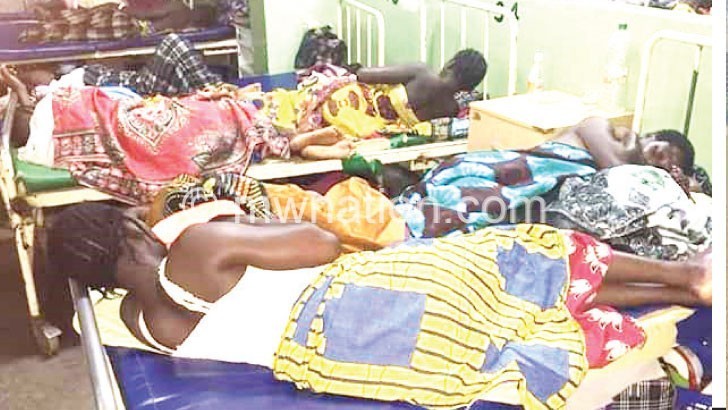Ntcheu’s labour pains
On Saturday around 8am, Margret Tchasitoni left for Ntcheu District Hospital on a motorcycle that cost her K2 500.
When the woman in labour hitched the motorbike, she wanted to arrive at the district’s largest hospital before the baby was born in deadly conditions.
Clearly, her zeal to give birth in a safe clinical setting ought to be good news to policymakers who want every child to be born with the assistance of skilled health workers.

However, the mother-of-three was shell-shocked when health workers told her to wait in the open as the hospital’s labour ward was full.
“I sat outside the ward for almost two hours, waiting for one of the women to give birth so that I could occupy her bed. Luckily, I found a bed around 11 am. My baby was born at around noon and I was happy it was a boy,” she narrates.
After delivery, Tchasitoni moved to a postnatal ward which also accommodates women waiting to give birth due to shortage of space at the hospital.
The 55-bed ward houses more than 100 women, with some sharing beds and others sleeping on the floor.
Lying under her bed was a pregnant woman, who did not find a place in the waiting room where Tchasitoni was requested to wait in the cold.
The room for four pregnant women takes thrice its bed space every night, with others sleeping on the floor.
The 12 patients squashed together like prisoners resembles the scene that incensed Tanzania President John Magufuli when he threatened to sack Muhimbiri Hospital administrator for subjecting patients to degrading conditions in wards.
Tchasitoni says: “It is a painful experience. This is the third time I am delivering at this hospital, but the challenges remain the same. Nothing has changed.
“We are still struggling to deliver and wait for the time health workers will discharge us.”
In random interviews, women in the congested wards said overcrowding forces some women to give birth in unsafe settings, even at home, while others only present themselves at home to evade fines introduced by traditional leaders.
Many chiefs across the country have introduced by-laws and fines against home-based deliveries to enforce a safe motherhood policy which requires every woman to give birth in a health facility.
Tchasitoni says her husband compels her to go to the district hospital for safe delivery as required by the Ministry of Health.
This costs her nearly all the money she saves from farming.
Ntcheu district health officer Mike Chisema says inadequate space is a major challenge haunting the hospital.
“We serve the peopleof Ntcheu and neighbouring districts of Balaka, Dedza and some parts of Mozambique, but lack of equipment and space deny us the opportunity to give them quality services,” he laments.
Out of the four toilets in the ward, only two are functional.
This increases the scramble for space when nature calls.
What happens when four or five occupants need to use the toilet at the same time is intriguing and dehumanising.
Hospital matron Madalitso Mwamlima says it is hard for the women who are in pain to tussle for toilets and bathrooms.
“Due to congestion, the bathrooms are usually blocked. Sometimes, only two out of the four bathrooms are fit to be used. We really need help to solve some of these challenges,” she says.
Malawi Health Equity Network (Mhen) executive director George Jobe says it is sad that several health facilities in the country are facing the same setbacks.
He says despite the revelation of the gaps at Ntcheu District Hospitals, there are some more that go unnoticed.
“It is high time our hospitals become humble enough to disclose their challenges to the public and lobby for support. Helping hands may come when the need is shared,” he explains.
Sustainable Development Goal three (SDG3) requires countries to ensure healthy lives and promote well-being for all at all ages by 2030.
The global goal embodies universal health coverage, a policy government has embraced to ensure every person receives quality healthcare services they need where they live, without enduring any financial hardship.
However, it is sad that women arriving at the district hospital on bicycles and motorcycles, which eat away at funds they need to survive and do business, end up in wards that hardly guarantee them quality health services.
Interestingly, both patients and health workers know this is a raw deal.
They want government and its partners to do something about it—to ensure every baby is born in a decent environment, not overcrowded wards with questionable sanitation and hygiene accessories. n





